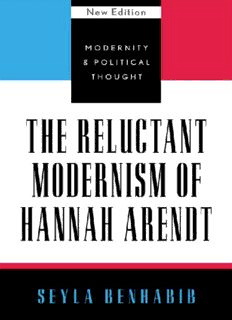
The Reluctant Modernism of Hannah Arendt PDF
Preview The Reluctant Modernism of Hannah Arendt
TH~ R~lUCTANT MOD~RNI~M Of HANNAH AR~NDT MODERNITY AND POLITICAL THOUGHT Series Editor: Morton SchooIman State University of New York at Albany This unique collection of original studies of the great figures in the history of political and social thought critically examines their contributions to our understanding of modernity, its constitution, and the promise and problems latent within it. These works are written by some of the finest theorists of our time for scholars and students of the social sciences and humanities. The following titles are available as New Editions from Rowman & Littlefield Publishers, Inc. The Augustinian Imperative: A Reflection on the Politics of Morality by William E. Connolly Emerson and Self-Reliance by George Kateb Edmund Burke: Modernity, Politics, and Aesthetics by Stephen K. White Jean-Jacques Rousseau: The Politics ofthe Ordinary by Tracy B. Strong Michel Foucault and the Politics of Freedom by Thomas L. Dumm Reading "Adam Smith": Desire, History, and Value by Michael 1. Shapiro Thomas Hobbes: Skepticism, Individuality, and Chastened Politics by Richard E. Flathman Thoreau's Nature: Ethics, Politics, and the Wild by Jane Bennett G.W.F. Hegel: Modemity and Politics by Fred R. Dallmayr The Reluctant Modernism of Hannah Arendt by Seyla Benhabib TH~ R~lUCTANT MOO~RNI~M Of HANNAH An~NOT NEW EDITION SEYLA BENHABIB ROWMAN & LITTLEFIELD PUBLISHERS, INC. Lanham • Boulder • New York • Toronto • Oxford For Colombe Benhabib with love and gratitude ROWMAN & LITTLEFIELD PUBLISHERS, INC. Published in the United States of America by Rowman & Littlefield Publishers, Inc. A wholly owned subsidiary of The Rowman & Littlefield Publishing Group, Inc. 4501 Forbes Boulevard, Suite 200, Lanham, Maryland 20706 www.rowmanlittlefield.com PO Box 317, Oxford, OX2 9RU, UK Copyright © 2000 AltaMira Press New Preface and Series Editor's Introduction Copyright © 2003 by Rowman & Littlefield Publishers, Inc. Typesetter: Christina M. Hill "The Personal is not the Political" appearing as the appendix is reprinted with kind permission of Boston Review. All rights reserved. No part ofthis publication may be reproduced, stored in a retrieval system, or transmitted in any form or by any means, electronic, mechanical, photocopying, recording, or otherwise, without the prior permission of the publisher. British Library Cataloguing in Publication Information Available The Library of Congress cataloged the previous edition of this book as: Benhabib, Seyla. The reluctant modernism of Hannah Arendt / Seyla Benhabib. p. cm. - (Modernity and political thought; vol. 10) Includes bibliographical references and index. 1. Arendt, Hannah-Contributions in political science. 2. Heidegger, Martin, 1889-1976-Contributions in political science. 3. Political science-Philosophy. I. Title. II. Series. JC251.A74B45 1996 320.5'092-dc20 95-50247 ISBN 0-7425-2150-8 (cloth: alk. paper)-ISBN 0-7425-2151-6 (pbk. : alk. paper) Printed in the United States of America eN The paper used in this publication meets the minimum requirements of American National Standard for Information Sciences-Permanence of Paper for Printed Library Materials, ANSIINISO Z39.48-1992. Contents Preface to the New Edition ix Series Editor's Introduction xxiii Morton Schoolman Introduction: Why Hannah Arendt? xxxvii The Pariah and Her Shadow: Hannah Arendt's Biography of Rahel Varnhagen A Methodological Preamble Rahel Levin Varnhagen's Quest for the "World" 5 The Salons as Female "Public Sphere" 14 The Rise of the Social 22 2 Jewish Politics and German "Existenz Philosophy": 35 The Sources of Hannah Arendt's Thought vi Contents Constructing a Homeland for a W orldless People 35 What Is "Existenz Philosophy"? 47 The Concept of the "World" in Martin Heidegger's 51 Being and Time 3 The Destruction of the Public Sphere and the Emergence of 62 Totalitarianism Methodological and Historiographic Puzzles of Arendt's 63 Origins of Totalitarianism Empirical-Analytical Aspects of Arendt's Theory of 69 Totalitarianism Imperialism and the End of the "Rights of Man" 75 Imperialism and the Dilemmas of the Modem 77 Nation-State The Politics of Memory and the Morality of 86 Historiography The Theorist as Storyteller 91 4 The Dialogue with Martin Heidegger: Arendt's Ontology of 102 The Human Condition The Meaning of Heidegger's Silence 102 Plurality, the World, and the Solipsism of Heidegger's 104 Ontology Action, Narrative, and the Web of Stories 107 Aristotle, Arendt, and Heidegger 114 5 The Art of Making and Subverting Distinctions: 123 With Arendt, Contra Arendt The Ontological and Institutional Dimensions of the 123 Public Sphere Contents vii The Continuing Struggle with Karl Marx 130 The Social and the Political: An Untenable Divide 138 6 From the Problem of Judgment to the Public Sphere: 172 Rethinking Hannah Arendt's Political Theory Thinking and Judging: 173 Rereading Eichmann in Jerusalem Judgment in Kant's Moral Philosophy and 185 Arendt's Reappropriation The Missing Normative Foundations of Arendtian Politics 193 From Public Space to Public Sphere: Hannah Arendt and 199 Jiirgen Habermas The Contested Public Sphere: Arendt, Habermas, and Beyond 203 Rethinking Privacy 211 Appendix: The Personal is not the Political 221 Bibliography 235 Index 249 About the Author 261 Preface to the New Edition A t the cusp of the twenty-first century, Hannah Arendt's reputation as one of the most important political thinkers of late modernity has been established worldwide. Such eminence was by no means always assured. Although a widely acclaimed political writer and public intellectual during her lifetime, her views were always contested. Arendt was also accused, and often, of meddling in areas like Jewish history, the Holocaust, and American desegregation debates-to name but a few-in which she was not a specialist. Actually, she objected to being called a "philosopher" and described herself to Karl Jaspers, her former teacher, as having become "something between a historian and a publicist." All this has changed. Certainly, controversy has not ceased to accompany her even after her death, particularly after the 1998 publication of her correspon dence with Martin Heidegger whose student and lover she had been. Yet Hannah Arendt has become a "classical" political philosopher and has assumed her place alongside the male stars of the Western intellectual canon. The Reluctant Modernism of Hannah Arendt was written as the contem porary Arendt renaissance was gathering momentum. My purpose in this ix
Description: